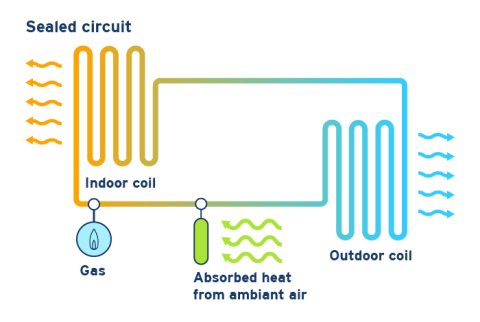Is a heat pump electric or gas?
There are actually heat pumps that are powered by natural gas or propane, but the heat pumps used to heat homes are powered by electricity.
Heat pumps can be powered by electricity or a heat source, including natural gas, propane, or even a solar thermal source. A heat pump used to heat and cool your home is powered by electricity, which drives a compressor that moves heat energy from outdoors to heat your home, or from indoors to cool it.
Types of electric heat pumps
For home heating and cooling, there are two types of heat pumps that are both based on the refrigeration cycle:
- Air-source heat pumps that exchange heat energy with the outdoor air
- Ground-source heat pumps that exchange heat energy with loops in the ground
The heat pump then moves heated or cooled refrigerant into one or more heat exchangers in the home. In North America, where heat pumps are typically used to create conditioned air, the heat exchanger can be in a forced air handler – in which case it is known as a central heat pump – or in one or more small heat exchanger units located in the living space, which are ductless heat pumps.
Finally, there are air-to-water heat pumps, known as hydronic heat pumps. These place the heat exchange in contact with water, which can then be pumped into radiators, in-floor heating coils, or a storage tank to supply hot water for a home. Hydronic heat pumps are great if you want a quiet and comfortable heating system, but they are less suitable for cooling because of condensation issues.
Gas-powered absorption heat pumps
Heat pumps that are powered by a heat source instead of electricity are called absorption heat pumps1. Unlike electrical heat pumps that drive a compressor, absorption heat pumps use water and ammonia in a cycle that alternately evaporates the ammonia to absorb heat and condenses it to release heat.

Absorption heat pumps have industrial applications, and are particularly useful for taking advantage of industrial processes that generate waste heat.
It’s even possible to use renewable sources such as geothermal and solar thermal instead of fossil fuel heating. However, most current applications use natural gas. Absorption heat pumps are a way to more efficiently provide heating compared with using combustion directly. The efficiency of a gas heat pump is approximately 150%.
One example of using absorption heat pumps to reduce greenhouse gas emissions is Fortis BC’s heat pump rebates2, which are aimed at natural gas heat pumps for commercial and institutional buildings. This makes sense for Fortis BC – a company that wants to continue to sell natural gas – but the best way to reduce carbon emissions is to use electric heat pumps powered by a low-carbon electric grid.
Learning more about electric heat pumps for your home
To learn more about heat pumps for heating and cooling your home, check out my articles on the topic or start with my article Heat Pumps for Homes: A Primer.
References
Absorption heat pumps (energy.gov) https://www.energy.gov/energysaver/absorption-heat-pumps ↩︎
Gas absorption heat pump rebates https://www.fortisbc.com/rebates/business/gas-absorption-heat-pump-rebates ↩︎



